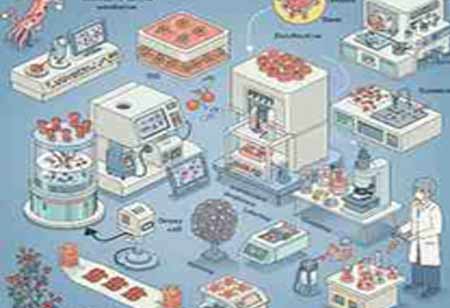Revolutionising Recovery with Addiction Rehabilitation and Detox Centres in Europe

By
Medical Care Review | Tuesday, April 22, 2025
Stay on top of your health and well-being with exclusive feature stories on the top medical clinics and treatment centers, expert insights and the latest news delivered straight to your inbox. Subscribe today.
Addiction rehabilitation and detoxification centres across Europe are transforming remarkably, driven by technological innovation and changing healthcare dynamics. Integrating AI into addiction treatment programs is among the most groundbreaking developments. With addiction affecting millions across the continent and an increase in cases related to alcohol, prescription medications, and illicit drugs, there is an urgent need for more intelligent, rapid, and personalised solutions. AI is emerging as a support tool and a core component in reshaping the future of addiction recovery.
Such technologies are particularly valuable in remote or underserved regions, increasing access to consistent and timely care. As AI becomes more integrated into addiction rehab environments, several innovative trends are shaping its application. ML models can alert clinicians when an individual shows signs of potential relapse by processing real-time data such as patient mood, social engagement, physiological responses, and therapy session feedback. It is crucial to prevent setbacks and adjust treatments promptly.
Driving Forces Behind AI Implementation in Addiction Rehab Centres
The pressing need for personalised, scalable, and outcome-driven solutions primarily drives the implementation of AI in European addiction rehabilitation centres. Traditional rehab approaches, while effective for some, often fall short of providing sustained recovery due to a one-size-fits-all treatment methodology. AI introduces data-driven personalisation by analysing behavioural patterns, treatment histories, genetic predispositions, and psychological profiles to tailor intervention strategies for each individual.
A critical factor fueling AI adoption is the rise in substance abuse disorders across Europe. As national healthcare systems face capacity challenges, AI offers the potential to automate and streamline several aspects of care, from early diagnosis and patient monitoring to relapse prevention. AI-powered predictive analytics enable clinicians to identify at-risk individuals earlier and design more effective care pathways, reducing readmissions and improving long-term recovery success.
Government initiatives and increasing investments in health tech infrastructure are accelerating AI integration. The European Union has prioritised digital transformation in healthcare through various funding programs which support AI research and innovation. Public health authorities advocate for technology-driven mental health and addiction care reforms, helping remove regulatory roadblocks that previously hindered AI adoption. Workforce shortages in mental health and addiction services are another significant motivator.
Trends in AI-Driven Rehab Transformation
AI-powered tools can analyse speech patterns during counselling to detect emotional distress, cognitive distortions, or signs of resistance. The insights help therapists adjust their communication style and therapeutic strategies more effectively. Combined with AI, VR simulates high-risk situations in a controlled environment, helping patients build coping mechanisms and decision-making skills. The apps track sleep, physical activity, mood, and medication adherence, offering real-time feedback and connecting users with support networks.
Some apps even offer AI-based cognitive behavioural therapy (CBT) modules tailored to individual progress, allowing for self-guided treatment between sessions. Ensuring compliance with the EU’s General Data Protection Regulation (GDPR) and patient trust is paramount. Developers must design AI systems with end-to-end encryption, anonymisation protocols, and ethical data governance models. Fragmented systems and inconsistent data recording make it difficult for AI algorithms to draw accurate conclusions. Interoperability remains a significant hurdle, and without common digital health records, the full potential of AI cannot be realised.
The human factor in addiction recovery cannot be understated. Critics argue that overreliance on AI may reduce the personal, empathetic touch necessary for healing. Training staff to understand and collaborate with AI tools is essential to maintaining therapeutic integrity. Developers must actively address bias during the design phase, and rehabilitation centres must regularly audit AI performance to ensure fair and inclusive treatment outcomes. It can be dangerous in addiction treatment, where equitable access and personalised care are critical.
Urgent Need for AI in the European Addiction Recovery Market
The impact of AI on the addiction rehabilitation industry in Europe is profound and multifaceted. AI enhances diagnostic accuracy, accelerates triage, and supports ongoing patient engagement. AI-driven tools have demonstrated their ability to increase early intervention rates and reduce relapse incidents, particularly when combined with wearable devices and real-time monitoring systems. The technologies are especially beneficial in outpatient detox models, where continuous oversight is critical but traditionally complex to maintain.
Predictive modelling helps administrators forecast patient volumes, manage staff, and coordinate services among teams. Implementing AI can lower long-term treatment costs by preventing relapses and improving outcomes. The financial impact of addiction on public health systems, encompassing emergency care, incarceration, and lost productivity, is significant. Many European countries are starting to see AI as a strategic investment in addiction treatment planning.
AI is becoming essential for supporting patients with dual diagnoses by improving care integration. Future addiction rehabilitation centres in Europe will likely embed AI tools into electronic health records (EHR), telehealth portals, and national registries, ensuring a seamless transition from detox to long-term recovery. Governments and healthcare providers must invest in AI education, enhance digital infrastructure, and foster public-private partnerships to drive innovation.







